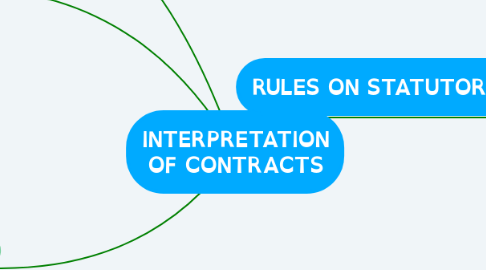
1. GENERAL RULE
1.1. If the terms of a contract are clear and leave no doubt upon the intention of the contracting parties, LITERAL MEANING of its stipulation shall control. (Art. 1370, par.1)
2. EXCEPTION
2.1. When the words appear contrary to the evident intention of the parties, INTENTION shall prevail. (Art. 1370, par. 2)
3. OTHER PROVISIONS
3.1. The contemporaneous and subsequent acts of the parties shall be principally considered. (Art. 1371)
3.2. Generality of the terms used in the contract does not comprehend things which are different from the intention of the other parties. (Art. 1372)
3.3. If the contract admits several meaning. (Art. 1373)
3.3.1. Valid and Legal vs. Invalid and Illegal → Valid and legal shall be adopted; General provisions vs. Specific provisions → Specific provisions shall prevail. (only if they cannot stand together)
3.4. Stipulations shall be interpreted together. (Art. 1374) A contract must be read in its entirety.
3.5. Words which have different significations shall be interpreted according to the nature and object of the contract. (Art. 1375)
3.6. Usage and custom of the place where the contract was executed shall be considered. (Art. 1376)
4. RULES ON STATUTORY CONSTRUCTION
4.1. GENERAL RULE
4.1.1. If the statute is clear, plain and free from ambiguity, it must be given its literal meaning and applied without attempted interpretation.
4.2. EXCEPTION
4.2.1. The judiciary may attempt to assess legislative intent where legislation is ambiguous, or does not appear to directly or adequately address a particular issue, or when there appears to have been a legislative drafting error.
4.3. OTHER PERTINENT FACTS
4.3.1. Look at the internal and external aids in attempting to determine the goals and purposes that the legislative body had in mind when it passed the law.
4.3.2. In the absence of legislative intent to define words, words and phrases used in statute should be given their plain, ordinary, and common usage meaning which is supported by the maxim generalia verba sunt generaliter intelligenda.
4.3.3. To give effect to both the particular and general words, treat the particular words as indicating all that is embraced in said class, although not specifically named by the particular words. (Ejusdem Generis)
4.3.4. Every statute is understand by implication to contain all such provision as may be necessary to effectuate to its object and purpose, including all such collateral and subsidiary consequences as may be fairly and logically inferred from its terms. (Doctrine of Necessary Implication)
4.3.5. Where a statute, by its terms, is expressly limited to certain matters, it may not, by interpretation or construction, be extended to other matters. (Expressum Facit Cessare Tacitum)
4.3.6. An ambiguous statute made by an administrative agency or lower court is entitled to great deference if the interpretation has been used over a long period. (Contemporaneous-Construction Doctrine)

